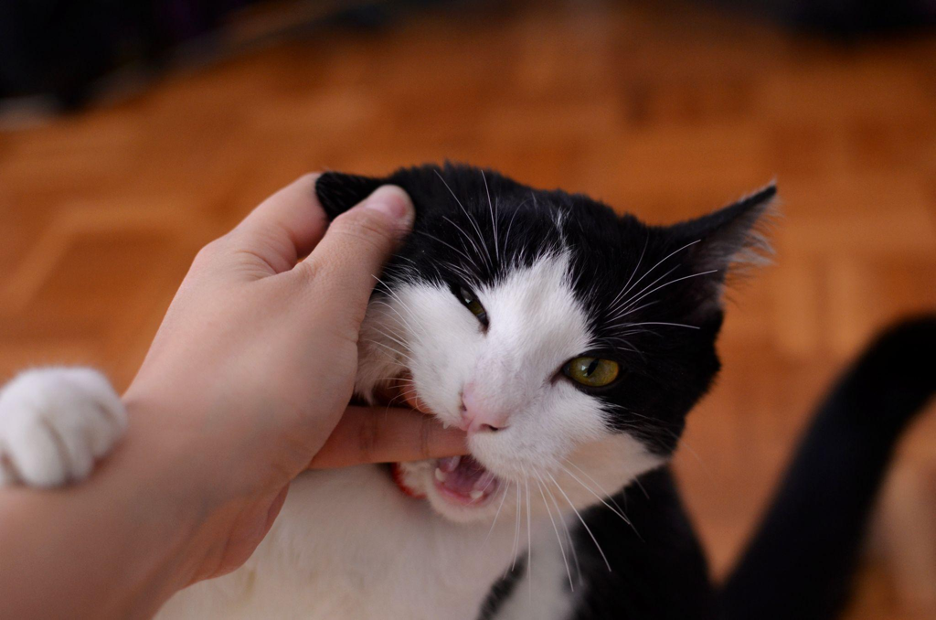
6 Tips To Get Your Cat To Stop Biting
Cat owners only want to spend time with their cats. Whether you prefer a playful cat, a lap cat, or a well-balanced cat, the bonding time you have is precious. This time together can be less fun though, if your cat is biting frequently. In most cases though, this biting behavior can be remedied fairly painlessly and quickly. The Refined Feline, a maker of modern cat furniture, has compiled a list of the 6 ways to get your cat to stop biting.
#1: Provide A Safe Space
When possible, most cats like having a separate space in addition to what they share with you. They may spend just as much time on the couch as you do, but still want a place to call their own. Even if you don’t have a “scaredy” cat, they can still get startled or awkward, and need a hiding spot. If they don’t have any place to hide, they may turn to bite to feel protected. Most cats won’t require a whole separate living space, but providing a few strategically and easily accessible places will help. Placing a couple of hidden beds or a large cat tower in a bedroom or a laundry room can give them a sense of peace and security, helping to decrease your cat’s biting. Find quiet places around other parts of your home to provide extra beds or a small cat tree that they can run to if need be.
#2: Be Aware of What Scares Them
Fear is typically the driving force behind most biting behaviors from your cat. When a cat is quickly placed into a new situation or hears a new sound, their “flight or fight” instincts kick in. If they don’t have a safe area to run to, your cat may end up choosing the fight response more often, which usually involves biting. You don’t want to end up punishing your cat for simply relying on their instincts, either. Instead, you will want to figure out what keeps triggering this response in them. Are visitors or neighbors being too loud? Do doors get slammed frequently in your home? Some holidays, including July 4th, can be particularly scary for cats. Loud noises can be very jarring to an animal, and they don’t know where it’s coming from or why it’s happening. These noises can make any well-rounded cat feel the need to defend themselves, but there are ways you can get your cat to stop biting.
Cats’ sense of hearing is much stronger than a human’s, so they’re going to hear things you won’t pick up on. Noises are going to be too loud for your cats if you think it’s too loud even for yourself. Think about these things as you look around your house and see it from a cat’s point of view. Find out where any startling or scary sights and sounds are throughout your home that may be scaring your cat. It could be something like their litter box is just past the loudest room in your home. This can create a potentially stressful situation for them multiple times a day just to use the potty. Or there could be a lot of traffic down your road and it is setting them on edge throughout the day. Your cat may not be showing signs of stress outright but you can keep an eye on them in case their mood changes. Being mindful of these situations and sounds can help you potentially remove them. This will help provide your cat with a more peaceful and less fearful home.
#3: Maintain a Routine
Just like people and dogs, most cats expect and crave routines. A routine helps create a balance and awareness of what’s to come for pets. With this knowledge, your cat will know what to expect, and having less fear in certain situations. When friends stop by, or the UPS delivery guy keeps knocking, these events throw a wrench into that routine. This can trigger fear in your cat and may cause them to bite. Having those safe spaces for them to run to will help make these new experiences or interruptions less intimidating. This can help to give them the confidence to venture out on their own during a party and get comfortable.
Remember that these new events can be overwhelming for cats to experience, so go slow for them. Give them treats to show your cat it’s a positive experience, and that they don’t need to be fearful. Let all your visitors give them treats too so they know new people aren’t intimidating but rather positive experiences. Don’t push your cats to be involved in all the activities, but let them get used to the new events slowly. Going at their pace will help them feel more confident and in control, which will decrease the likelihood of them biting.
#4: Be Mindful of Your Cat’s Boundaries
Most cats need to feel comfortable in situations on their own terms, but that doesn’t mean we have no responsibilities either. This definitely applies when teaching children how to properly interact with cats and when to leave them alone. Children won’t necessarily pick up on the subtle clues from cats, which can lead to biting. Some cats will be more patient with children as opposed to adults, but they can still reach a limit, and sometimes quickly. If adults visiting aren’t familiar with cats either, they may need a slight tutorial on how your cat reacts as well. People may continue petting a cat, oblivious to their flicking tail, or their eyes narrowing at them. Gently alerting your guests to stop petting your cat can help with preventing any potential bites.
Overstimulation can frequently occur during parties, where a cat is getting near non-stop attention. Your social butterfly cats are going to want to be the center of attention in a get-together. This can quickly overwhelm your cat and sassy cats won’t simply turn and walk away! They will most likely react with a swipe or even a bite to say they’re done with the attention. Your guests may not see this coming or when a cat is getting ready to bite, so give them any guidance that may help.
#5: Don’t Promote Biting
You may be encouraging bad behavior in your cats without realizing it, and this can increase bites. Cats that love to wrestle and play will inevitably turn to your arms and hands as toys. This type of play can eventually encourage biting that’s unprovoked and can get harder and harder over time. A simple way to get your cat to stop biting this way is to no longer use your arms or hands to rough house with your cat. This type of play only makes biting and other inappropriate behavior allowed to your cat, which can create issues as they grow up. To encourage better behavior overall, only play with your cat using wands and other toys from the very beginning to get your cat to stop biting.
#6: Keep Your Cat Busy
Another possibility for your cat’s biting is that they may just be bored. Your cat may realize that biting will elicit a reaction from you, so they chomp down on your arm to see how you’ll react. Your cat’s boredom may stem from feeling lonely at home while you’re at work or simply not having enough playtime. Try playing more often with your cat to see if that helps improve their biting, or give them different activities to curb their boredom. If you have a single cat at home, they may want more physical attention, which another cat may help with. Make sure your cat would welcome a furry sibling though, as introducing another cat is a big step.
Helping Your Cat to Stop Biting With These Tricks
Remember to be patient during this process, no matter how you begin to help your kitty decrease their biting. A cat’s understanding of the world is very different from humans, so keep this in mind. Seeing improvements in their behavior may be slow going, and it may take a little while to get your cat to stop biting overall. Remind yourself as often as possible that you’re taking the right steps to give yourself and your cat a relaxing, bite-free living environment.





